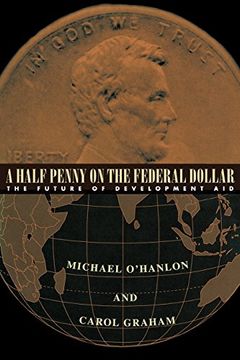Share
A Half Penny on the Federal Dollar: The Future of Development aid (in English)
Michael E. O'hanlon; Carol L. Graham (Author)
·
Brookings Institution Press
· Paperback
A Half Penny on the Federal Dollar: The Future of Development aid (in English) - Michael E. O'hanlon; Carol L. Graham
$ 22.86
$ 28.57
You save: $ 5.71
Choose the list to add your product or create one New List
✓ Product added successfully to the Wishlist.
Go to My WishlistsIt will be shipped from our warehouse between
Monday, June 24 and
Tuesday, June 25.
You will receive it anywhere in United States between 1 and 3 business days after shipment.
Synopsis "A Half Penny on the Federal Dollar: The Future of Development aid (in English)"
Spending on U.S. foreign affairs, which constitutes only about one percent of the federal budget, is being sharply reduced. Under the President's 1996 budget plan, it will decline by just as great a percentage as defense between 1990 and 2002—and by substantially more than defense over the 1980-2002 period. No other major category of federal spending will undergo a real cut over either time period. The shrinking budget, totaling about $19 billion in 1997, will still have to fund the State Department, international broadcasting and educational exchanges, trade subsidies and investment guarantees for U.S. business overseas; United Nations operations including peacekeeping, and all types of foreign assistance.In this book, O'Hanlon and Graham focus primarily on this last component of international spending. Specifically, they analyze U.S. official development assistance (ODA) to poor countries. The authors place U.S. ODA in a broad historical, international, and economic perspective. They then recommend an alternative approach to ODA for the United States as well as other donors. They favor continuing to provide humanitarian and grass-roots aid to most poor countries, but providing ODA to promote macroeconomic growth only to those countries that maintain coherent, market-oriented economic policy frameworks. The authors argue that to provide effective aid, as well as to maintain U.S. leadership in world affairs, net resources for ODA and the international account need to increase only modestly.
- 0% (0)
- 0% (0)
- 0% (0)
- 0% (0)
- 0% (0)
All books in our catalog are Original.
The book is written in English.
The binding of this edition is Paperback.
✓ Producto agregado correctamente al carro, Ir a Pagar.

